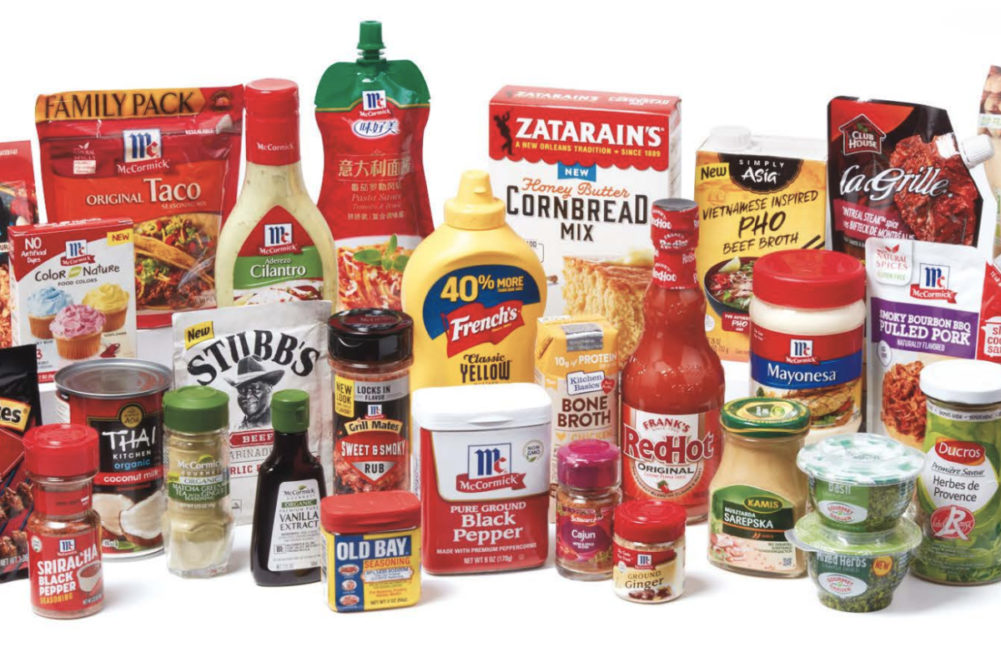HUNT VALLEY, MD. — COVID-19 continued to impact China in the first half of 2022 with second-quarter results from McCormick & Co. providing proof.
The company’s Consumer segment sales in the Asia/Pacific region declined 18% in the quarter ended May 31. Lower volume in China brought on by restrictions related to COVID-19 and the exit of lower margin business in India combined to drive a 20% reduction in volume in the region.
China is McCormick & Co.’s second biggest sales country, said Lawrence E. Kurzius, chief executive officer. A plant in Shanghai produces about 40% of total China sales.
“The lockdowns lasted roughly 75 days, with our Shanghai plant forced to close for two weeks at the onset, with employees living in the facility,” he said in a June 29 earnings call. “Once we were able to reopen, we were impacted by lockdown-related labor shortages due to workers being quarantined. During April and May, we incurred significant incremental manufacturing and transportation costs to supply our customers.”
Net sales for the company overall slipped 1% to $1.54 billion from $1.56 billion, which reflected a 1% unfavorable impact from currency. While pricing actions had a 7% favorable impact, it was offset by a 7% decline in volume and product mix brought on by a 4% negative impact related to discrete items that included lapping last year’s second-quarter US trade inventory replenishments, a disruption to China’s consumer consumption, the exit of low margin business in India and the war in Ukraine.
Net income of $118.5 million, or 44¢ per share on the common stock, was down 35% from $183.7 million, or 69¢ per share, in the previous year’s second quarter.
In the Consumer segment, net sales declined 8% to $866.1 million from $945.2 million in the previous year’s second quarter. In the Americas, consumer sales declined 4%. Pricing actions partially offset lower volume and product mix. Europe, Middle East and Africa, Consumer sales plunged 18%, which McCormick & Co attributed to restrictions related to COVID-19 and a 1% unfavorable impact from lower sales in Russia and Ukraine.
In the Flavor Solutions segment, net sales rose 10% to $670.7 million from $611.5 million. Pricing actions increased sales in all three geographic regions. In the Americas, Flavor Solutions sales rose 12% due to continued growth with packaged food and beverage companies and higher sales to branded foodservice customers.
Cost inflation and supply chain issues continue to challenge the food industry, Mr. Kurzius said.
“To partially offset cost pressures, we've taken multiple pricing actions and, as planned, we are raising prices again,” he said. “Inflation continued to escalate, and we've adjusted our upcoming pricing actions accordingly. We appreciate our customers working with us to navigate this environment.”
The first wave of pricing actions in the Americas was phased in during the fourth quarter of fiscal 2021, he said. The second wave came in April in the second quarter, and the third wave will go into effect at the end of the third quarter.
“With the first wave, we saw a very low level of elasticity,” Mr. Kurzius said. “With the second wave, we are seeing more price elasticity although still below historical levels. While consumer spending has remained strong, consumers are now under significant pressure for broad-based inflation, notably fuel prices and other macro factors. As we look ahead and our additional pricing actions are phased in, the elasticity we experienced may change, but we still expect the impact to be lower than historical levels.”
Supply chain issues have eased for McCormick & Co.
“I'd say our worst disruption on supply chain really was third quarter of last year, and (it) has continued to get better incrementally every month,” Mr. Kurzius said. “We're not out of the woods by a long shot in terms of normalization, but the really broad scale disruptions that we were experiencing a year ago are behind us and the disruptions are pretty much more discrete factors.”
McCormick & Co.’s net income in the six months ended May 31 was $273.4 million, or $1.02 per share on the common stock, down 21% from $345.5 million, or $1.29 per share, in the same time of the previous year. Six-month net sales increased 0.7% to $3.06 billion from $3.04 billion.




